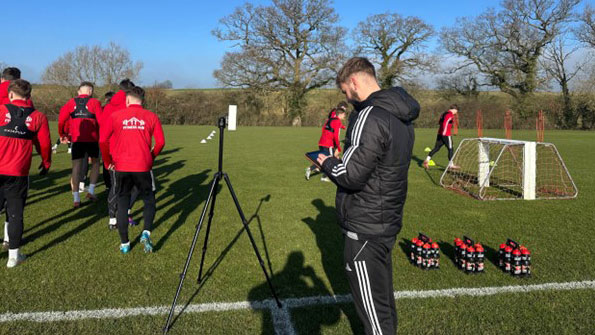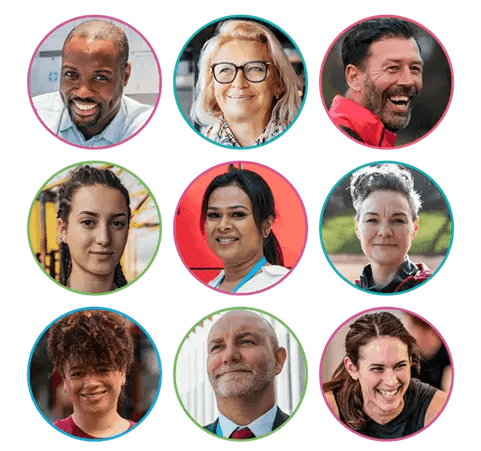Can you tell us about your current role and how your degree helped you get there?

I am currently the First Team Sports Science Intern at Swindon Town, the Lead S&C Coach at Chippenham Youth Academy and Lead S&C for STWFC first team. My degree in Physical activity and health promotion from Oxford Brookes University played a pivotal role in getting me to where I am today.
The combination of theoretical knowledge and practical skills I gained during my time at university has been invaluable in shaping my career. The in-depth understanding of sports science principles, from biomechanics and physiology to nutrition and injury prevention, has enabled me to approach coaching and performance analysis with a scientific mindset. Additionally, the hands-on experience I had through placements and projects allowed me to apply that knowledge in real-world environments, which prepared me for the fast-paced and ever-changing demands of professional sports.
Moreover, the university fostered a critical thinking approach, which has been essential in problem-solving and adapting to the unique challenges that come with working in sports science roles. Networking opportunities with professionals and the mentoring I received also helped me make connections in the industry that eventually led to my current roles. The practical workshops, research projects, and exposure to cutting-edge technology during my degree have also been key in keeping me up to date with the latest advancements in the field.
What experiences, qualifications, or skills from your time at university have been most valuable in your career so far?
One of the most valuable aspects of my time at university was the combination of qualifications, hands-on experience, and the expert guidance I received from my lecturers. Alongside my degree, I achieved my CIMSPA qualifications in Strength and Conditioning and Personal Training. These qualifications were instrumental in building my practical knowledge and credibility in the field, particularly in strength and conditioning, which I apply daily in my current roles.

The lectures themselves were a huge asset to my time at university. The theoretical knowledge I gained - from biomechanics and exercise physiology to nutrition and injury prevention - has provided a solid foundation for everything I do. My lecturers were not just lecturers; they were mentors who shared invaluable advice based on their own experiences in the field. Their practical insights and industry advice helped me understand how to apply my knowledge effectively and stay adaptable in the fast-evolving sports science landscape.
Another defining experience was my third-year placements, which, although clinical in nature, were incredibly impactful for my growth. Working in these settings allowed me to develop a range of transferable skills - such as assessing individuals’ needs, designing rehabilitation programs, and monitoring progress - that directly apply to my sports roles. The clinical environment also enhanced my understanding of injury management and rehabilitation, which has been crucial for my work in professional sports. The experience helped me learn to approach athlete care and performance optimisation with a holistic mindset, a skill I rely on heavily in my current positions.
The combination of my CIMSPA qualifications, the knowledge gained from my university lectures, and the transferable skills developed during my clinical placements has given me a well-rounded and adaptable approach to sports science. I’m able to bring evidence-based practices into my work, whether I’m helping athletes recover from injury or optimising their performance in training, and the guidance from my lecturers continues to resonate in my career.
Was there a defining moment during your studies that shaped your career path?
Yes, there was a defining moment during my studies that really shaped my career path. During one of my placements with the Silver Lining Brain Injury Charity, I had the opportunity to shadow a neuro-physiotherapist. I was tasked with creating a training program that was not only unique but also specific to a client’s individual needs and rehabilitation goals. The program I developed was designed to help the client regain strength and mobility, and seeing the positive results from that program was incredibly rewarding. The client achieved their goal, and knowing that my work contributed in a small way to their progress made a lasting impact on me.
This experience was a turning point in my career. It made me realise how powerful and transformative strength and conditioning can be, not just for general performance but also in rehabilitation settings. The success of that program sparked my desire to pursue strength and conditioning further, leading me to seek out more opportunities in the field. It taught me the importance of tailoring programs to individual needs, which I now apply regularly in my current roles with athletes.
That moment solidified my passion for using strength and conditioning to improve both athletic performance and recovery, and it’s been the driving force behind my career ever since.
What advice would you give to students looking to follow a similar path?
One of the most important pieces of advice I can give is to embrace voluntary roles. Willingly taking on unpaid positions will set you apart, giving you invaluable hands-on experience and industry connections. It’s crucial to recognise that now, while you have fewer responsibilities, is the best time to make these sacrifices. The time you invest early in your career will pay off in the long run, opening doors that might otherwise remain closed.
Additionally, don’t be afraid to try and fail. Every mistake is a learning opportunity that will shape your understanding and skills. Some of the most valuable lessons come from experiences that don’t go as planned. Developing resilience and adaptability is key in this field.
Say yes to every opportunity that comes your way. Even if something doesn’t seem like the perfect fit at first, trying it and realising it’s not for you is far more valuable than turning it down without knowing what you might have learned. Each new experience contributes to your growth, and often, unexpected opportunities lead to the most rewarding career paths. Keep an open mind, be proactive, and take advantage of every chance to gain experience and expand your skill set.
What’s next for you in your career?
I have recently received an unconditional offer to pursue a Master’s in Strength and Conditioning, which I am excited to start. Alongside my studies, I aim to continue in my current roles where possible while seeking the next opportunity that will allow me to develop both as a professional and as a coach. My focus remains on gaining as much hands-on experience as possible, refining my skills, and embracing new challenges that will contribute to my growth in the field of sports science.
Whilst my time with Swindon Town FC is coming to an end with the end of the season getting closer, I have learnt invaluable skills and experience that I will take with me into my future roles and education.
CIMSPA Higher Education Partnership
Once an institute has become a CIMSPA partner, all degree programmes relating to a career within the sport and physical activity sector will be eligible to be endorsed and quality assured.
We already work in partnership with some of the leading sport and physical activity educations institutions in the country, including Oxford Brookes University, to enhance the employability of your sport and physical activity sector-related graduates.
Find out how your establishment can partner with the sector workforce’s only chartered professional body.
Become a CIMSPA Higher Education Partner
Find out more about our new Careers Hub, which is a comprehensive, one-stop shop for high quality careers, learning and training.
CIMSPA Careers Hub




